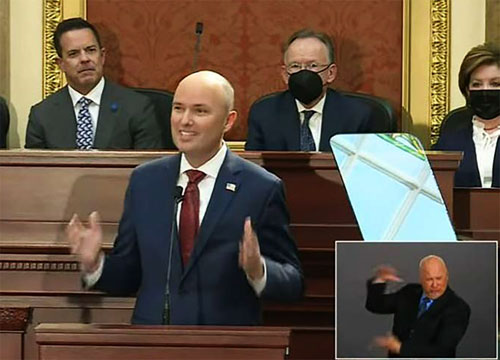Brice Wallace
In a State of the State address sprinkled with economic elements, Gov. Spencer Cox pushed for adding a grocery tax credit for Utah families, prioritizing Utah’s quality of life, removing government regulations that increase housing prices, investing in infrastructure, overhauling state and local economic incentives, and developing sustainable energy.
Starting his second year in office, Cox said that decisions made during the COVID-19 pandemic and residents’ “incredible resilience” have led to Utah being in its “strongest fiscal condition ever with the largest rainy day fund, lowest unemployment and largest budget surplus in our state’s history.”
Cox urged passage of bills offered by four legislators to remove government regulations that he said needlessly increase housing prices in Utah.
“We can increase supply without decreasing quality of life,” the governor said. “This one will not be easy. But we cannot let our state become California.
“For the first time ever, people on the Wasatch Front are experiencing something that those of us from rural Utah have felt for far too long: the terrible realization that our kids and grandkids might not be able to live near us. In rural Utah, that happens because of a lack of jobs. Along the Wasatch Front, it’s due to the unsustainable increase in housing prices. We have to get this right. We must act now.”
Cox said the state faces “a generational opportunity” to invest in infrastructure because of its strongest economy in the U.S. “If the federal government is going to continue recklessly spending money borrowed from future generations, it is our duty to invest in projects that will benefit our children and grandchildren,” he said.
He also asked legislators to support 26 new policy initiatives presented by the United Economic Opportunity Commission, including “a dramatic overhaul and removal of many state and local economic incentives.” Bills proposed by the commission focus on workforce development, education alignment with industry, housing availability, a better startup ecosystem, reworking rural economics, bolstering international trade, multicultural economic empowerment and bridging opportunity gaps.
His push for Utah to become “the nation’s leader in sustainable energy development” stems from a need to not be reliant on foreign nations to be the primary suppliers of the U.S.’s clean energy future.
“Twenty-eight of the world’s 35 most critical minerals can be found right here in our state,” Cox said. “We can show the country and the world how to responsibly harness the power of our precious natural resources while being wise and protective stewards of this land that we cherish.”
He also seeks support for the Utah Sustainable Health Collaborative, which has what he described as “the audacious goal” of lowering healthcare costs and improving health outcomes. “The concept is simple but revolutionary: In Utah we can create a new system focused on health, not healthcare,” he said.
As a way of easing the effects of inflation — rates are the highest in 40 years — Cox proposes an additional $160 million grocery tax credit. “With this year’s [budget] surplus, I think we can all agree that it’s time we gave some of that hard-earned money back to Utahns,” he said.
A common theme of state government the past few years has been to accommodate or manage population and economic growth while maintaining Utah’s hallmark quality-of-life characteristics. Cox echoed some of those sentiments in his address.
“While water is the greatest limiting factor to our growth, there are several other pressing issues we must address, including air quality, transportation, housing affordability and other infrastructure needs,” the governor said. “Our goal should never be to grow for growth’s sake. We must prioritize a quality of life that all Utahns can enjoy.”








